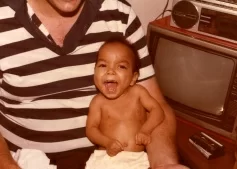 without a thought on my part. But Luke came to my mind yesterday and I looked up some information on him and discovered that his birthday had just passed. I found this old article that I wrote about Luke a few years ago. I thought I'd share it again. I am convinced that there are important and significant lessons we can learn from his life, and that I need to regularly share what I think they are. I hope you enjoy this!
without a thought on my part. But Luke came to my mind yesterday and I looked up some information on him and discovered that his birthday had just passed. I found this old article that I wrote about Luke a few years ago. I thought I'd share it again. I am convinced that there are important and significant lessons we can learn from his life, and that I need to regularly share what I think they are. I hope you enjoy this!The mysteries of God are a part of the Christian life that can often lead to confusion, doubt and even discouragement for believers.
- For some, it's a pride thing. We want to have answers – we want to understand, to be able to grasp the complexities of Biblical truth and God's plan for mankind.
- For some, God's mysteries – the unexplained things of life – are stumbling blocks to faith:
1. Why do bad things happen to good people?
2. Why does He allow pain, suffering and evil to thrive in our world?
Several months ago we were witnesses to the aftermath of the tragedy in Pennsylvania involving the Amish community, where, good, decent, hard working, non violent people were subjected to unspeakable cruelty towards their children. How can this happen?
3. One of our CSC children, who grew up in the worst poverty imaginable in Cebu City, was adopted into a family in the United States several years ago. Well meaning people would tell her how lucky she was and how God obviously had a wonderful plan for her life. She had a hard time with that and would sometimes ask her parents, "But what about all the kids who are still there, who weren't adopted, and who are still suffering and dying? What is God's wonderful plan for their lives? Why me and not them?
For many of us, we celebrate the goodness of God in our lives, we praise him for his healing, for material comforts, for blessing our efforts – even as we observe people who remain sick or disabled, who suffer in poverty – those who efforts and initiatives end in disappointment and ruin.
There are two extremes in terms of people's reactions to the things about God and life that are not understood.
1. There are those who try in vain to grasp the ungraspable – to be able to reduce the mysteries to understandable formulas or explanations. I remember a young seminarian who came to Cebu and who filled the pulpit of our church on a Sunday evening. He preached for an hour on the "peace of God that passes all understanding." Perhaps he felt that if he preached long enough he could crack that nut and open our understanding!
We all know those who have reduced the book of Revelation to precise charts and timetables, giving us easy to understand categories for all of human history and, most especially, the times to come.
2. A second category are those who shake their heads and say, "We'll only know these answers when we get to heaven." They suspend inquiry, not bothering to seek answers to the perplexing questions of life.
Living and working in a Third World country like the Philippines brings some of these mysteries to the front of our lives. Poverty, and all that goes with it, is "in your face." People often ask me "How do you like living in the Philippines?" That's a tough one to answer. Life anywhere has its highs and lows. Some days are great, others are difficult. I often answer this way:
1. When I'm sitting down to a nice breakfast I am aware that, within a few meters of my house are families that have no breakfast.
2. When I'm driving to the office or the Shelter I often pass people walking along the road who, for lack of a few cents can not even afford public transportation and must walk.
3. When I stop to buy medicine for my family or the CSC kids, there are people standing nearby whose children are dying for lack of that very same medicine.
Why am I blessed and they are not?
I recall a conversation with a missionary a few days after Cebu was hit by a strong typhoon. Many of our CSC workers lost their roofs or their entire homes. The houses of the poor were devastated by the high winds and torrential rains. The missionary said that it had been such a miracle how God spared the missionary homes from damage, holding his hands of protection around us during the storm. I remember wondering whether it wasn't more a matter of our having cement houses and strong metal roofs.
Why did our CSC kids have to suffer so much? And how much more, those who live on the street and cannot be admitted to CSC?
These are tough questions. When it comes to trying to understand our own suffering, the Bible gives some answers. For example, Romans 5:3-4 tells us that suffering produces perseverance, perseverance character, and character, hope. And the Bible gives us additional hope that we will someday come to see God's purpose and mysteries:
"But now we see through a glass dimly, but then face to face."
And we hear the testimonies of Christian brothers and sisters who have lived through terrible times and have turned negatives into positives in their lives.
Several months ago I was attending a conference in Bismark, North Dakota. One of the featured speakers was Steve Saint, Steve's father, Nate Saint, was one of the five missionaries killed in 1956 by Aucan warriors in Equador. Steve told about what that tragic day meant to his family, and what it was like when his dad, his hero, didn't come home that day. We saw video of his current family life, and saw a man who was interacting with Steve's children, and who was being referred to as "Uncle." It turns out that this was the very man who had killed Steve's father, who had come to know Jesus and had experienced the forgiveness of God and of the Saint family and now was a part of their family – an amazing story of how good things had come out of tragedy and suffering.
So the clear message is that God has a plan for our lives, we will discover that plan in the right time. He is writing our life's stories, but some of the chapters are difficult ones.
We can understand this. We can, when aided by the Holy Spirit, see how difficulties and suffering are part of a purification process for us, and that we, like Job, will eventually be better people for it.
But what about people who, because of major disabilities, are unable to understand their situation, unable to discern the hand of God or his plan for their lives. Where is the purification and growth and ultimate value for these people? What could God's purpose possibly be?
Back on 1982 a baby was born in a charity ward in a small hospital in Cebu City. 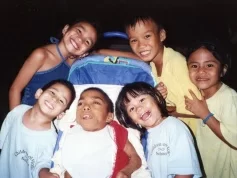 The baby underwent cardiac arrest during birth and was without oxygen for an extended time. Unlike many cases of charity patients, the hospital staff decided to resuscitate the baby, even after he had suffered massive brain damage and cerebral palsy. The baby's mother abandoned him in the hospital, and after a couple months Luke was referred to CSC. When we took him in he appeared to be a bouncing baby boy. We did not know that he would not develop physically beyond about a year and a half, or mentally beyond a few months. Luke would never speak, nor have voluntary movement of his arms or legs.
The baby underwent cardiac arrest during birth and was without oxygen for an extended time. Unlike many cases of charity patients, the hospital staff decided to resuscitate the baby, even after he had suffered massive brain damage and cerebral palsy. The baby's mother abandoned him in the hospital, and after a couple months Luke was referred to CSC. When we took him in he appeared to be a bouncing baby boy. We did not know that he would not develop physically beyond about a year and a half, or mentally beyond a few months. Luke would never speak, nor have voluntary movement of his arms or legs.
Luke became a fixture at CSC. For over 23 years he was an integral part of our lives and a symbol of CSC and what we are all about.
Many times Luke would be hospitalized – often due to upper respiratory infections. He fought for his life many times. There were at least a dozen times when we were sure that he would die. The doctors had told us that he wouldn't make it past five years old. Then they revised it to nine, then 11 – certainly he wouldn't reach his teenage years.
One time, when Luke was critically ill our staff met to pray and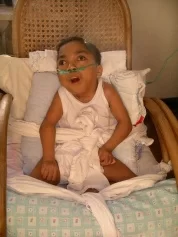 I asked them to reflect on his life. Here is why: I believe that God had a purpose for Luke's life when he created him. I believe that He uses people like Luke to teach us important things. But here is the rub: If we don't spend time reflecting on these lessons, then Luke's life is useless. Its up to us to allow God to make sense of Luke's life.
I asked them to reflect on his life. Here is why: I believe that God had a purpose for Luke's life when he created him. I believe that He uses people like Luke to teach us important things. But here is the rub: If we don't spend time reflecting on these lessons, then Luke's life is useless. Its up to us to allow God to make sense of Luke's life.
And what are the lessons that we found? What has God taught us through his life?
1. First, life is precious. Even though he had nothing to live for, from the world's point of view, Luke clung to live almost ferociously. Some of us who have much more to live for take life casually, we take life for granted. Not Luke. Every day was a struggle. Every breath had to be fought for. Life is a gift from God and we should treat it carefully.
2. God has provided us with opportunities, through Luke's life, to minister to him in significant and life-saving ways. He has provided an avenue for us to live out the biblical mandate to minister unto the "least of these," because, truly, Luke was in that category. Hundreds of people have been given a blessing to participate in the support of CSC that reaches out to children like Luke and many others with other special needs.
3. In so doing, He has given us a chance to show others a Godly value system that doesn't reserve love and attention for those who have something to give back, or who have "potential" or a bright future. For many people who live in a developing country, where resources are limited, this has been a difficult lesson to learn. How could we justify spending so much money for Luke's hospitalization when other, "normal" kids needed care? Luke's life gave us the opportunity to teach about the value of life and about how God looks at all of us.
4. Luke has been a tremendous ambassador for CSC. People around the world remember observing the loving care that he received by our staff and workers. They remember his famous smiles. They may quickly forget the names of the staff or other children, but they remember Luke. "How's Luke doing?" we get asked wherever we go to talk about the ministry of CSC. And our care of Luke helps us explain the true nature and core values of our work in the Philippines.
5. Luke has been a safety valve for those that had an opportunity to know him. My job as Field Director of CSC involves lots of administrative chores, like making budgets, government relations and various kinds of problem solving. There are days when I get stressed out and start to feel the weight of the world on my shoulders. But all I needed to do is to drive a few short miles to where Luke lived, to hold him in my arms, and I get a clear picture of what real struggles are all about. My struggles paled in comparison to what Luke faced every day. Self pity may be easy for some people, but those that knew Luke have no excuse for feeling sorry for themselves. What a great gift that was to all of us.
A little over a week before we left Cebu, Marlys called me on my cell phone and told me that I should get to the hospital quickly, as Luke wasn't doing well. He had been hospitalized for over a week and his breathing was bad. I had gotten messages similar to this one throughout Luke's life, so I went to the office and took care of a few things. But the Lord laid it on my heart to go see Luke and when I entered his room his breathing was extremely labored. He looked different than I had ever seen him, and it became clear that he was dying. I sat down next to him, kissed him and looked into his eyes. For 23 years we had loved this boy. It wasn't easy to say goodbye. I said to him, "Luke. You can go. Go to be with Jesus, Luke. I love you." Within a couple of minutes Luke took his last breath. 23 years of pain, suffering, limitations, hospitalizations, forced breathing, skin rashes and infections were over. We would never see Luke's smile again.
As Luke was dying in that hospital room, I made a promise. I'm not sure if I was making a promise to Luke, to God or to myself. But I decided then and there that I was going to talk about Luke on our coming furlough. I believed then and do now, that the church of Jesus Christ needs to hear about Luke, that the lessons of his life are important ones. Many Americans are complainers - full of self pity. People who have so many material comforts are unsatisfied. American discourse is increasingly a chorus of victim and entitlement claims. Charles Sykes, in his book "A Nation of Victims: The Decay of the American Character" states that, "in a nation where everyone is a victim, no one is a victim." In our preoccupation with our own needs we have a hard time seeing the needs of others – people like Luke.
In his song "God Help the Outcasts," the Hunchback of Notre Dame poses several difficult issues:
I don't know if there's a reason
Why some are blessed, some not
Why the few You seem to favor
They fear us, flee us,
Try not to see us.
The first part we have already examined. The second is our call to arms. "Why the few You seem to favor, they fear us, flee us, try not to see us."
I don't know what factors might make it difficult for us to see the needs of society's outcasts. Perhaps we are too busy. Maybe our personal and church calendars are so full that there just isn't room for Luke, or the man who had fallen to thieves at the side of the road, to break into our day. Maybe we are numbed or fatigued by the needs of others, or simply overwhelmed by the circumstances of our own lives. Maybe we have become cynical. "Why did that guy travel this road at this time carrying that amount of money? He deserves what he got!"
Maybe, just maybe, Luke can help cut through the apathy, the self-centeredness and cynicism of our lives. He was a person with significant needs that he didn't cause. He was totally dependent on others to live. His life had none of the possibilities and opportunities that we take for granted every day. He needed us so very much. Maybe Luke can serve as a symbol of many others that we come into contact with. Maybe Luke can help us rescue our lives.
Stick To It
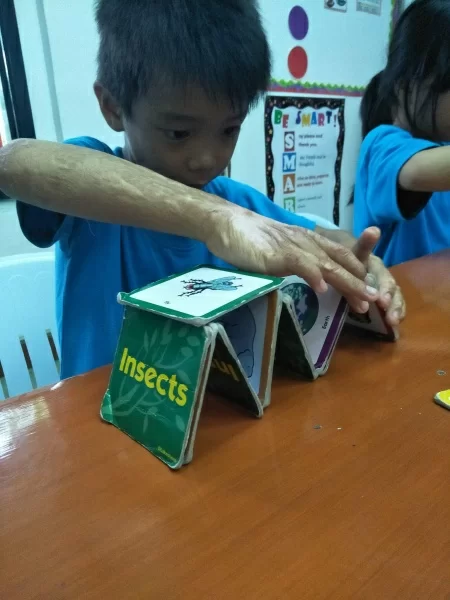
"We can do anything we want to do if we stick to it long enough." -Helen Keller
The level A1 class has just finished the theme STICK TO IT. As a part of our wrap-up activity, the kids tried their best to build houses out of cards.
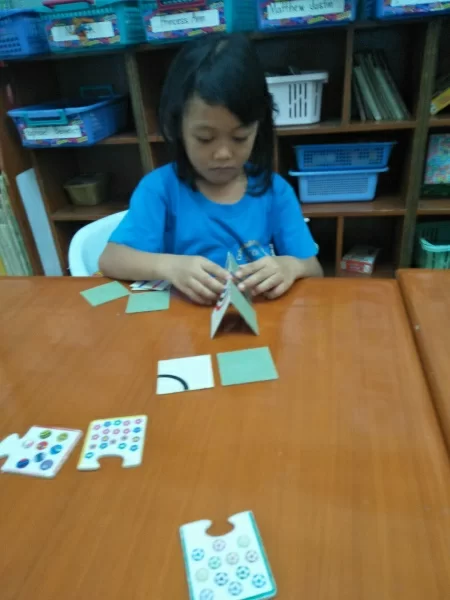
They enjoyed the activity and they all wanted to build houses, even if it wasn't easy. There were times when the cards tumbled down and sometimes it was hard to make them stand but these kids were eager to achieve their goals. They always told themselves to keep on trying and to never give up.
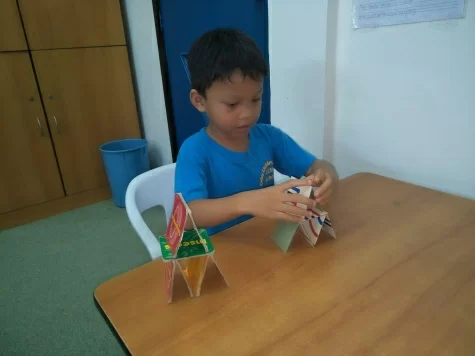
After several attempts and construction success, a huge smile on their faces showed that the "stick to it" attitude was worth it!
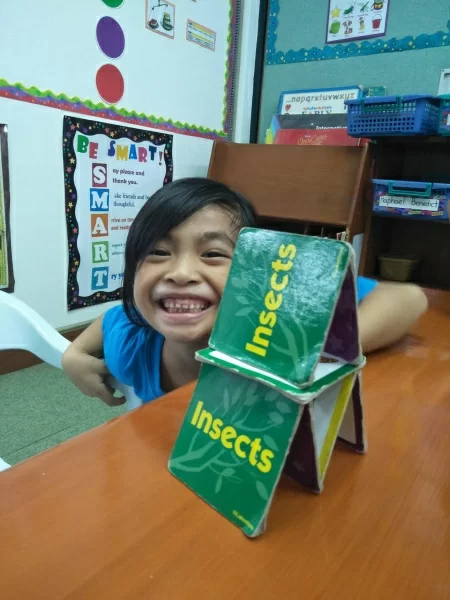
Nang Exyon
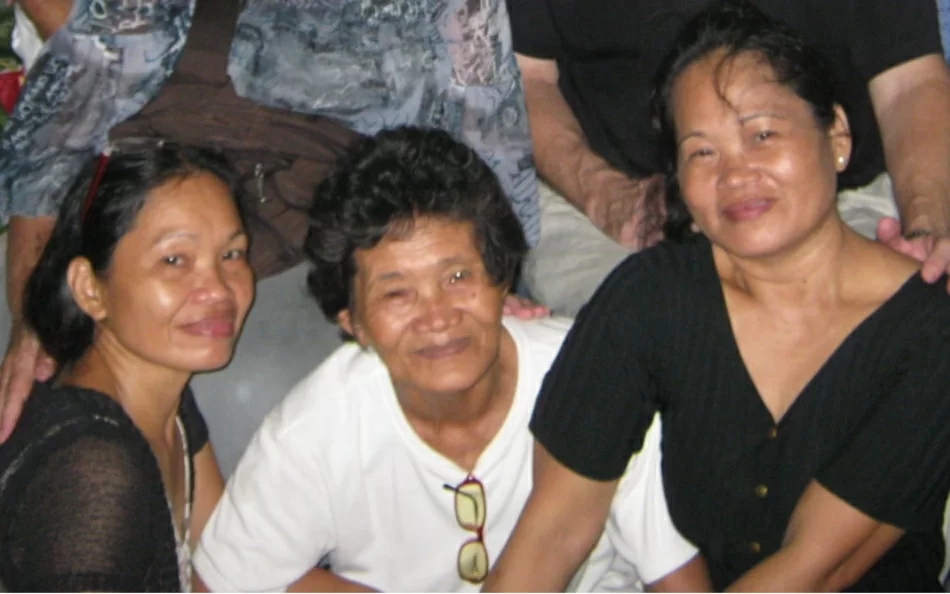 Nang Exyon Martinez produced nine children. Six of them have worked for CSC over the years. Five are currently our employees: Lit-Lit, Perry, Dodong, E-boy and Edwin. Her husband, Teo, who died several years ago, was also an employee at one time. He and Exyon were among the earliest friends of the CSC staff in Cebu back in 1979 when the ministry began. She was a regular attender of the Bible study we held in our home in Bulacao, and would host prayer meetings in their home. Her son, Jessie, who became very sick during those days, was the first child in the community that we were able to help by purchasing medicine. Our intervention helped save his life and cemented a friendship between CSC and the Martinez family that continues to this day. Nang Exyon died suddenly on Christmas Day. She was 79.
Nang Exyon Martinez produced nine children. Six of them have worked for CSC over the years. Five are currently our employees: Lit-Lit, Perry, Dodong, E-boy and Edwin. Her husband, Teo, who died several years ago, was also an employee at one time. He and Exyon were among the earliest friends of the CSC staff in Cebu back in 1979 when the ministry began. She was a regular attender of the Bible study we held in our home in Bulacao, and would host prayer meetings in their home. Her son, Jessie, who became very sick during those days, was the first child in the community that we were able to help by purchasing medicine. Our intervention helped save his life and cemented a friendship between CSC and the Martinez family that continues to this day. Nang Exyon died suddenly on Christmas Day. She was 79.
Exyon was a delightful person. She loved CSC deeply and was a loyal friend. She was so proud of her children and thankful that they could work at CSC. She worked hard throughout her life and, in spite of poverty, was a generous person who was always looking for ways that she could help others. At her funeral many people spoke of her heart and what an impact she had made in their lives. Just a week before she died Exyon attended a dedication for the new church building in Bulacao. She was so happy that day and we talked about the old days and how God had led CSC to Bulacao 39 years ago. She will be greatly missed by her family, the church and by CSC. God bless the memory 0f Nang Exyon!
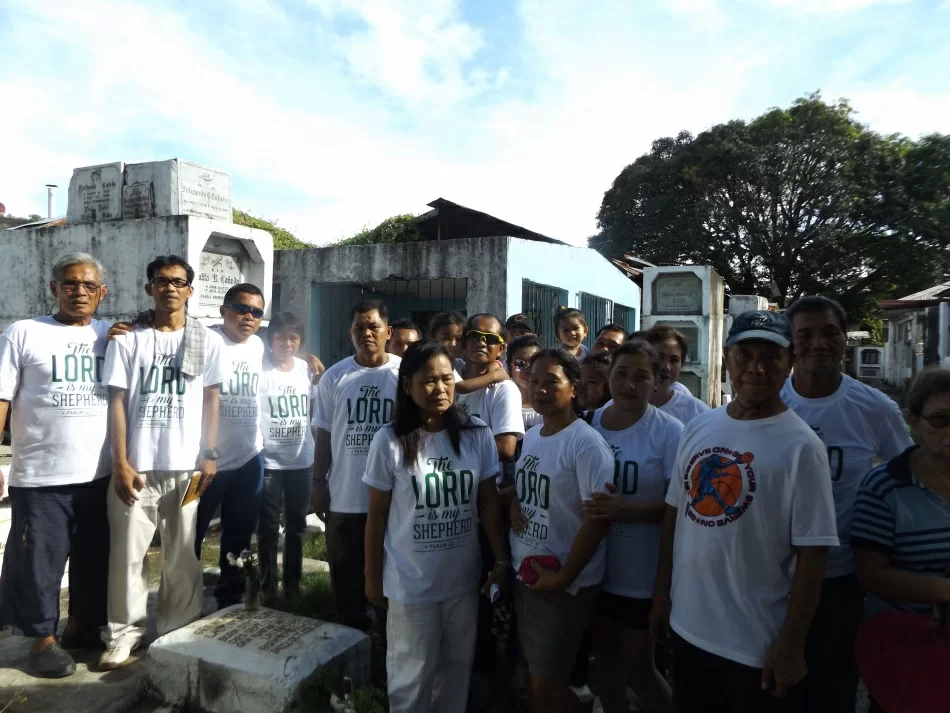 Some of the Martinez clan at the cemetery for Nang Exyon's burial.
Some of the Martinez clan at the cemetery for Nang Exyon's burial.
Christmas 2017 at CSC
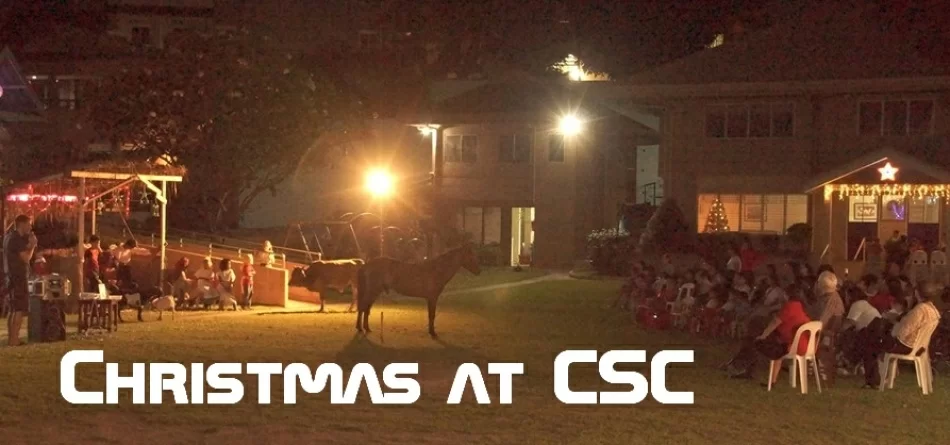 Christmas at CSC is a combination of many things: the Children of Hope School program, Gifting a poor family through Junel's Box, Christmas Eve with Santa and his elves, Christmas Day live nativity and a progressive dinner for the kids at the homes of staff.
Christmas at CSC is a combination of many things: the Children of Hope School program, Gifting a poor family through Junel's Box, Christmas Eve with Santa and his elves, Christmas Day live nativity and a progressive dinner for the kids at the homes of staff.
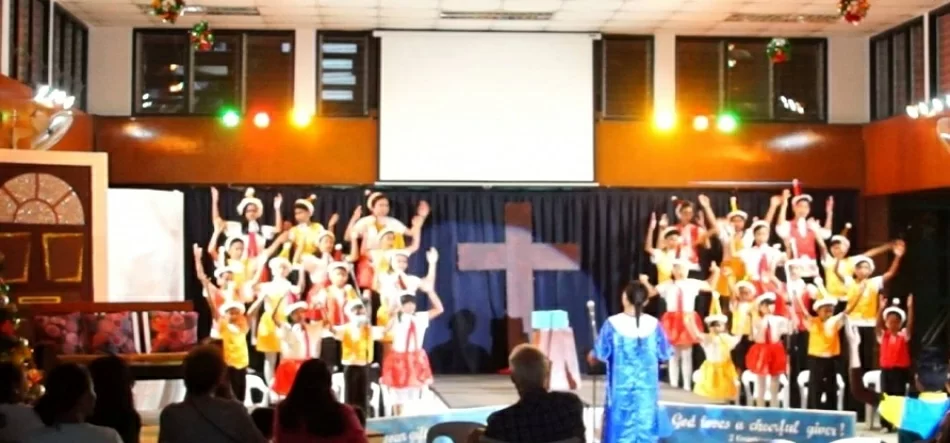 The school play this year was entitled "Christmas Carol" and featured lots of singing and a lesson in giving and generosity. The costumes were colorful and the students did a great job. Thanks to our teachers who worked so hard to prepare the kids of this evening.
The school play this year was entitled "Christmas Carol" and featured lots of singing and a lesson in giving and generosity. The costumes were colorful and the students did a great job. Thanks to our teachers who worked so hard to prepare the kids of this evening.
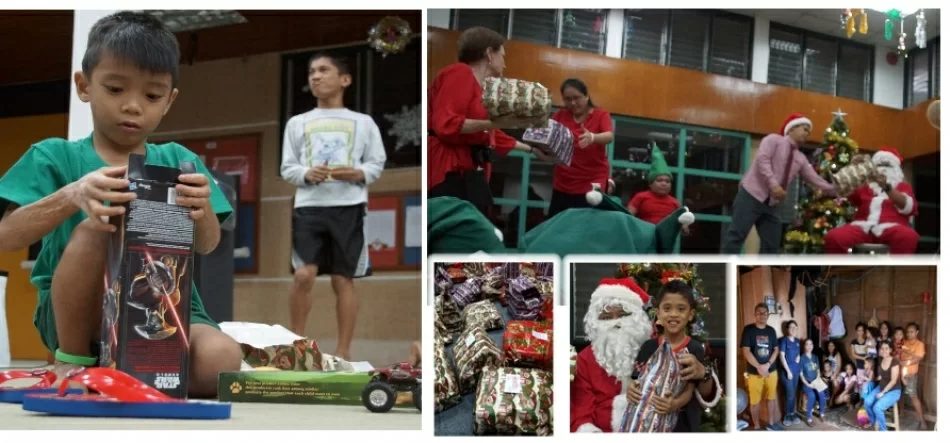 The kids loved their gifts, and enjoyed brightening the lives of a family who needed help so desperately this year. Our social work staff coordinated this year's Junel's Box program where our kids gave from their saved allowances to buy food and building materials for a poor family. And thanks to Santa for showing up at just the right time with gifts for every child.
The kids loved their gifts, and enjoyed brightening the lives of a family who needed help so desperately this year. Our social work staff coordinated this year's Junel's Box program where our kids gave from their saved allowances to buy food and building materials for a poor family. And thanks to Santa for showing up at just the right time with gifts for every child.
The generosity of our faithful supporters puts the tools in the hands of our loving and energetic staff to help make Christmas a very special time for our children.
The Gift of Time in Cebu
In this season marked by gift giving and receiving, I've been reflecting about a significant gift that I received earlier this year. In July, I travelled to the Philippines and had the opportunity to spend 6 days visiting CSC.
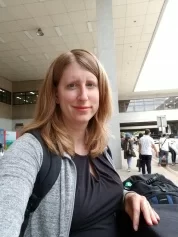
While I've had connections to CSC for almost 15 years, this was my first actual trip there – not for lack of desire to have made the trip earlier, but working within the realities of parenting and being an at-home mom with our 4 young kids. Being there was, of course, amazing, and a true gift. The life-giving ministry that takes place there came alive for me in a whole new way. I don't want to lose that deepened sense of connectedness that I brought back to Minnesota with me, and as part of that desire to hold onto connection I recently revisited some of the journaling that I'd done during my week at CSC. I'd like to share a few excerpts from my journal with you – in hopes that you also will feel a rekindled sense of connectedness to the truly life-altering work that takes place every day, hour by hour and minute by minute at CSC.
From our first day at the shelter – Wednesday, July 19th
It is emotional to be here with the kids! To see little babies who don't belong to anyone-yet here belong to everyone, sweet toddlers who remind me of Berit (our 2 year old daughter) who have already lost someone for a lifetime, preschoolers coming close or slipping in a hand to be held who don't know what it's like to be someone's child, busy elementary schoolers curiously and boldly saying hello – their life stories already so complicated, and tall, growing-up pre-teens who act like they are at camp, yet don't have family to return home to. I've gotten lots of tears welling up in my eyes – for the kids, when seeing Paul being tender and familiar with kids of all ages, and in thinking about life and all of its complexity. So thankful to be here, and so aware that life can be hard.
From Thursday, July 20th
I've seen lots of poverty today while driving, especially on the city tour with Marlys. It's so surreal to drive by it and then to be done with it, while it is remains someone's total life and story. I like to imagine that all of the kids I see who are way too close to the moving cars in the street have a parent close by, or that they are just going for a walk, but I know that isn't true. Especially aware today of CSC as a SHELTER.
From Tuesday, July 25th
CSC is impressive. The physical campus, the stories behind the campus coming to be, the contrast for the kids between what was and what is – as well as new potential for what might be, the many aunties and uncles, the holistic set up that addresses so many important parts of each child's experience, the team of leaders that is both forward thinking and evaluative... and of course the kids themselves. I'm struck today by the RESILIENCY of the kids. Each child here carries with them a heavy, heart-breaking story, but they keep going.
While on the airplane as I journeyed home, as part of my processing of the days at CSC, I made two lists in my journal. One of the lists was titled "Hard Things", and the other was titled "Joyful Things". I'll share a few of the items that were part of each list.
Hard Things – Hearing kids who had been matched for adoption talk about where they would be going when they joined their new families (Australia, Tennessee, Italy), knowing that other kids listening had no adoption plan. Seeing endearing, funny, smart and talented older kids who don't have much time left until their adoption window closes – knowing that their amazing personalities could never be captured on paper and that their age would likely be what would speak loudest to potential adoptive families. Wondering if the CSC kids were wondering if I was "sizing them up" and considering the possibility of adding them to our family, and even choosing what to say about themselves based on that. Thinking about how quickly childhood passes, and "biding time" while waiting for a family. Hearing babies cry and seeing toddlers sitting in highchairs... even when being carefully tended to by aunties, as Paul would say, "It's not the same as being in a family."
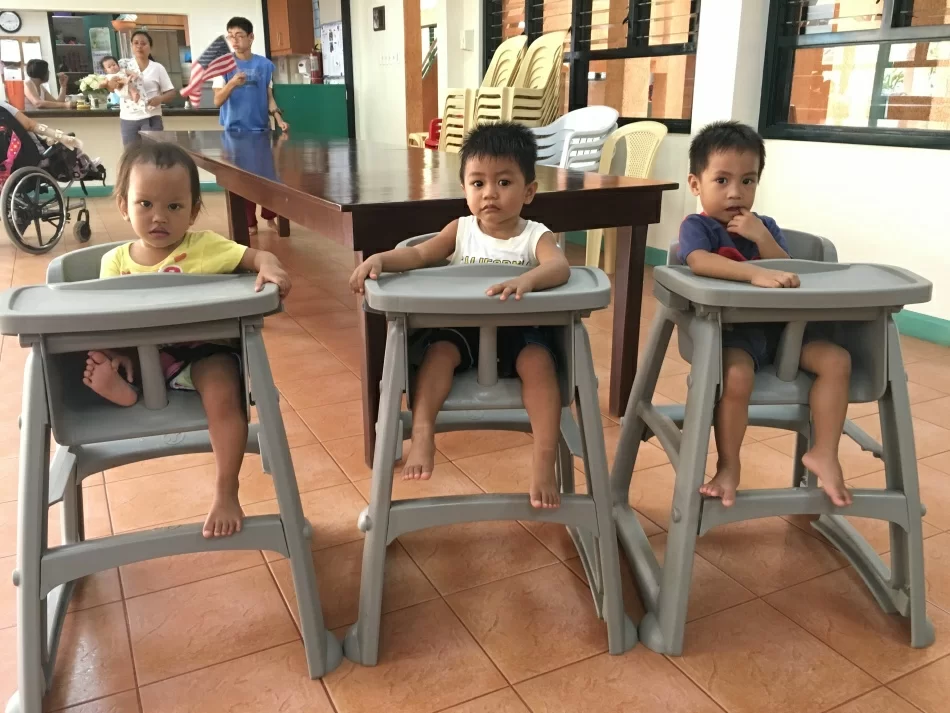
Joyful Things – Bright smiles and sparkling brown eyes. Hearing the house parents lead the kids in devotions before breakfast and after dinner. Listening to the kids sing songs of worship – the sound of their voices floating out from the homes and through the campus. Seeing the kids smartly dressed in their matching school uniforms and getting to walk with them up the hill to school. Visiting Jacob and Ginda's rooms, specially created for them, and seeing how CSC is absolutely committed to them as valued family members. Getting to pray a prayer of thanks and blessing with the overnight workers one night as they started their shift. Being surrounded by a group of 11, 12 and 13 year old girls who just wanted to hang out and talk. Genuinely feeling that there are capable, thoughtful leaders in place. Seeing the employees call out, hug and playfully tease the kids. Sensing real openness from the staff to work together for the children.
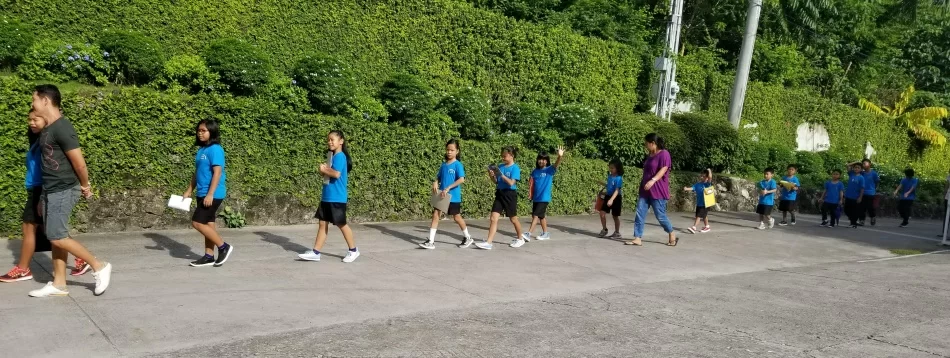
Those are some excerpts from my CSC experience. It was truly such a gift to be able to spend those 6 days in July immersed in the daily life of CSC. I'm grateful in a deeper, broader way for this ministry as I'm reminded of both hard and joyful parts of CSC. As a CSC board member, I am especially thankful for the community that supports CSC. To know that children's lives are being changed each day is truly amazing and inspiring, and I'm so thankful for all of you who make that possible!
Thankfulness
This is crunch time at CSC. Year-end giving, especially in December, is a huge part of CSC's income for the year, so we really rely on the generosity of our supporters at this time. We always come down to the last few days of the year needing a bunch of money! Is it stressful? Well, no, at least not a lot for me. I have witnessed so many years of God providing through his people, our supporters, that I don't really get stressed. Concerned and hopeful, yes. Prayerful, yes. But I can honestly say that I don't spend too much time worrying.
The challenge for me is to remember to be thankful while being confident and expectant. I don't want to take God's goodness to CSC for granted. Ever. We have been trying to be more intentional lately about teaching thankfulness to our CSC children. They receive so many blessings every day in terms of food, clothing, medical care, education, recreation, counseling, and fun activities. Lots of people work very hard to provide all of this for them. They know that they will receive nice gifts at Christmas and on their birthdays. If someone should skin their knee a loving nurse will attend to it. Social workers are preparing their legal documents to prepare them for adoption. House parents are available for emotional and spiritual support. Staff members have time to encourage them and show their love in practical ways. More than a hundred people are working for them every day, not to mention all of our supporters! We want them to be thankful for what they have. Part of this entails remembering where they came from. All of our kids grew up in poverty, and most experienced malnutrition, sickness and despair. We want them to appreciate what they have been given.
We have a program called 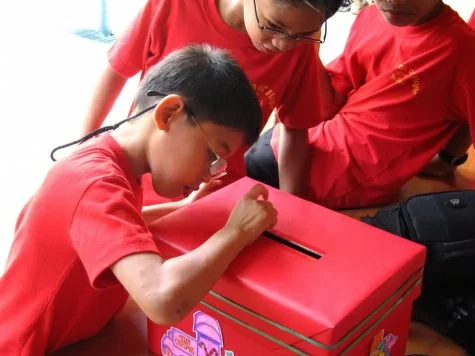 Junel's Box that helps with this. Named after a former resident who had a huge heart for others, this program allows the CSC children to give money from their allowances to help a poor family that is selected by our social worker team. We buy food, building materials and household items and deliver them to the family just before Christmas. It is a time for the kids to "give back" and remember that there are people who are hurting and need a helping hand. We also tell our children regularly about all of you dear people who give generously to help us take care of them. I want them to know that the money that CSC has doesn't come from me or the wealth of the staff. It comes from cool people, most of them who are of modest means, who love them. These reminders are important to our kids. Every night at bedtime the children pray, thanking God for all of you who bless their lives.
Junel's Box that helps with this. Named after a former resident who had a huge heart for others, this program allows the CSC children to give money from their allowances to help a poor family that is selected by our social worker team. We buy food, building materials and household items and deliver them to the family just before Christmas. It is a time for the kids to "give back" and remember that there are people who are hurting and need a helping hand. We also tell our children regularly about all of you dear people who give generously to help us take care of them. I want them to know that the money that CSC has doesn't come from me or the wealth of the staff. It comes from cool people, most of them who are of modest means, who love them. These reminders are important to our kids. Every night at bedtime the children pray, thanking God for all of you who bless their lives.
Thanks to our friends for year-end gifts and prayers and for all that you do throughout the year to make life better for these awesome kids.





